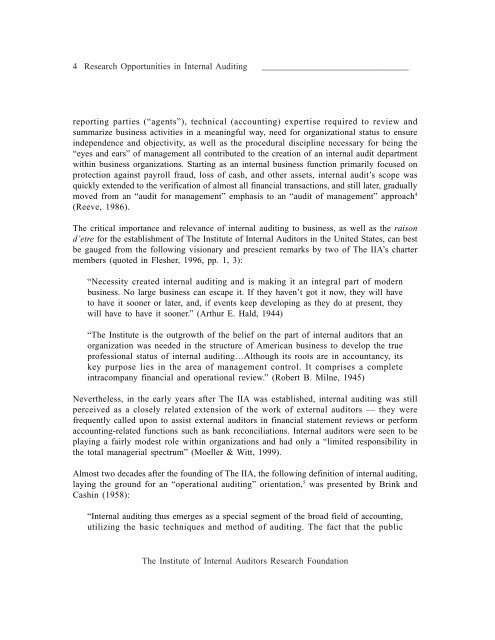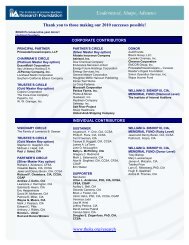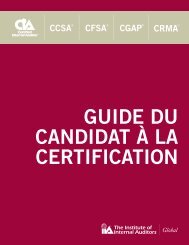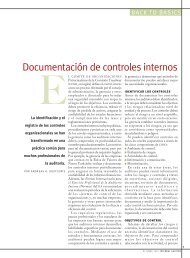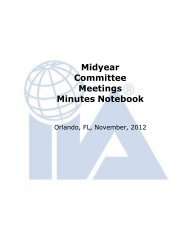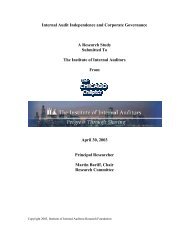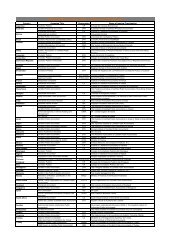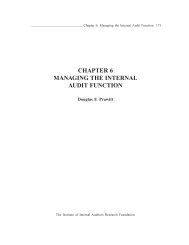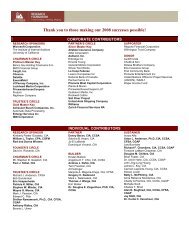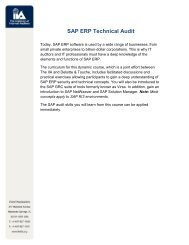Chapter 1.pmd - The Institute of Internal Auditors
Chapter 1.pmd - The Institute of Internal Auditors
Chapter 1.pmd - The Institute of Internal Auditors
You also want an ePaper? Increase the reach of your titles
YUMPU automatically turns print PDFs into web optimized ePapers that Google loves.
4 Research Opportunities in <strong>Internal</strong> Auditing _________________________________<br />
reporting parties (“agents”), technical (accounting) expertise required to review and<br />
summarize business activities in a meaningful way, need for organizational status to ensure<br />
independence and objectivity, as well as the procedural discipline necessary for being the<br />
“eyes and ears” <strong>of</strong> management all contributed to the creation <strong>of</strong> an internal audit department<br />
within business organizations. Starting as an internal business function primarily focused on<br />
protection against payroll fraud, loss <strong>of</strong> cash, and other assets, internal audit’s scope was<br />
quickly extended to the verification <strong>of</strong> almost all financial transactions, and still later, gradually<br />
moved from an “audit for management” emphasis to an “audit <strong>of</strong> management” approach 4<br />
(Reeve, 1986).<br />
<strong>The</strong> critical importance and relevance <strong>of</strong> internal auditing to business, as well as the raison<br />
d’etre for the establishment <strong>of</strong> <strong>The</strong> <strong>Institute</strong> <strong>of</strong> <strong>Internal</strong> <strong>Auditors</strong> in the United States, can best<br />
be gauged from the following visionary and prescient remarks by two <strong>of</strong> <strong>The</strong> IIA’s charter<br />
members (quoted in Flesher, 1996, pp. 1, 3):<br />
“Necessity created internal auditing and is making it an integral part <strong>of</strong> modern<br />
business. No large business can escape it. If they haven’t got it now, they will have<br />
to have it sooner or later, and, if events keep developing as they do at present, they<br />
will have to have it sooner.” (Arthur E. Hald, 1944)<br />
“<strong>The</strong> <strong>Institute</strong> is the outgrowth <strong>of</strong> the belief on the part <strong>of</strong> internal auditors that an<br />
organization was needed in the structure <strong>of</strong> American business to develop the true<br />
pr<strong>of</strong>essional status <strong>of</strong> internal auditing…Although its roots are in accountancy, its<br />
key purpose lies in the area <strong>of</strong> management control. It comprises a complete<br />
intracompany financial and operational review.” (Robert B. Milne, 1945)<br />
Nevertheless, in the early years after <strong>The</strong> IIA was established, internal auditing was still<br />
perceived as a closely related extension <strong>of</strong> the work <strong>of</strong> external auditors — they were<br />
frequently called upon to assist external auditors in financial statement reviews or perform<br />
accounting-related functions such as bank reconciliations. <strong>Internal</strong> auditors were seen to be<br />
playing a fairly modest role within organizations and had only a “limited responsibility in<br />
the total managerial spectrum” (Moeller & Witt, 1999).<br />
Almost two decades after the founding <strong>of</strong> <strong>The</strong> IIA, the following definition <strong>of</strong> internal auditing,<br />
laying the ground for an “operational auditing” orientation, 5 was presented by Brink and<br />
Cashin (1958):<br />
“<strong>Internal</strong> auditing thus emerges as a special segment <strong>of</strong> the broad field <strong>of</strong> accounting,<br />
utilizing the basic techniques and method <strong>of</strong> auditing. <strong>The</strong> fact that the public<br />
<strong>The</strong> <strong>Institute</strong> <strong>of</strong> <strong>Internal</strong> <strong>Auditors</strong> Research Foundation


